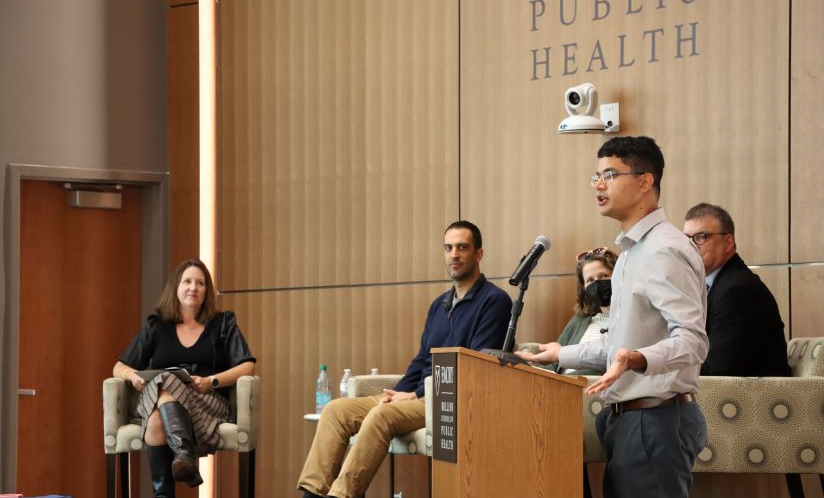What’s Next in Public Health

Emory experts weigh in on the future of public health in the U.S. in the wake of the 2024 presidential election.
The recent presidential election has created uncertainty for many about the future direction of public health in the U.S.
On Tuesday, November 12, Rollins presented the “What’s Next in Public Health?” panel in collaboration with the student organization Rollins Election Day Initiative (REDI) to discuss what the public health landscape may look like during the second Trump administration.
Dean M. Daniele Fallin, PhD, moderated the panel, which featured faculty from both Rollins and Emory College of Arts and Sciences, including Lauren Christiansen-Lindquist, PhD, associate professor of epidemiology; David Davis, PhD, associate professor of political science; and Noah Scovronick, PhD, assistant professor of environmental health.
Panelists weighed in on how the landscape may change for climate, reproductive health, and humanitarian aid in the next four years.
Climate Change Action
Scovronick described that there are three ways that governments can deal with climate change:
- Mitigation: reducing greenhouse gas emissions
- Adaptation: implementing policies and programs that protect citizens from the impacts of climate change
- Geoengineering: using technology to either pull carbon out of the atmosphere or add elements into the atmosphere that help reduce warming
Federal policy changes, such as rolling back existing environmental policies or enacting new ones, could impact all three. However, Scovronick noted that climate action frequently happens at the state and local level, as well as through community-based and faith-based organizations, so there are many avenues for progress.
Public health and climate are deeply intertwined, and doing work that seems unrelated could actually make a large impact.
“A lot of climate work is not directly climate related. If you’re working in the health care sector, in transportation, in housing, you are working on climate resilience and adaptation,” says Scovronick. “A tricky piece of climate is that it affects everything, but that also means that wherever you are working in public health or environmental sustainability, you are working on climate as well.”
Reproductive Health
Outside of Donald Trump’s stance that individual states control abortion regulation, we do not currently know many details about his reproductive health policy positions. Christiansen-Lindquist pointed out a few areas of potential concern:
- Threats to the Affordable Care Act and Title X funding could lead to more limited access to contraceptives and other family planning services.
- A more radical and literal interpretation of the Comstock Act, a law that bans mailing “obscene” materials, could make it illegal to send abortion medications through the mail.
- More restrictive abortion policies could threaten access to in vitro fertilization.
“Reproductive health and perinatal health topics exist on a continuum and are all very interconnected,” says Christiansen-Lindquist. “We should all be mindful of that as we are paying attention to tracking changes in health outcomes over time and trying to mitigate the impacts of new policies.”
Humanitarian Emergencies
With the new administration seeming poised to push an America-first agenda, Davis believes that the role the U.S. plays in conflict and humanitarian emergencies around the world is set to shift.
One way that this could play out is through the administration’s approach to immigration. This could include fewer resources dedicated to granting asylum to refugees and could also worsen the ongoing humanitarian crisis along the southern border of the U.S. The country potentially pulling back from international organizations, such as climate organizations, could also impact our ability to cooperate with other countries to address ongoing crises around the world.
Despite this, Davis remains optimistic about the potential for individuals to make an impact.
“We can all do things to try to push the government, either directly or indirectly,” he says. “That could mean finding NGOs whose mission you care about and supporting them. Even if our government doesn’t do so, we can do so, and that can have a really positive impact.”
How to Make an Impact
One important message stood out throughout the event: While public health is inherently political, it does not have to be partisan. By engaging in dialogue, listening to each other, and being strategic in the ways we talk about public health, we can start to bridge divides.
The panelists also offered advice for advocating and making an impact on the public health:
- Be in contact with local elected officials about the public health issues that matter to you.
- Plug into local organizations that are doing work on the ground.
- Progress is incremental, but it is important to celebrate the small wins as they happen.
- Don’t try to take on too much, and rest when you need to.
The event ended on an optimistic note as Akshay Deverakonda, a second year MSPH student in the Department of Epidemiology and co-president of REDI, made closing remarks.
“Turn to look at the people on either side of you,” he urged the attendees. “You are what’s next in public health.”